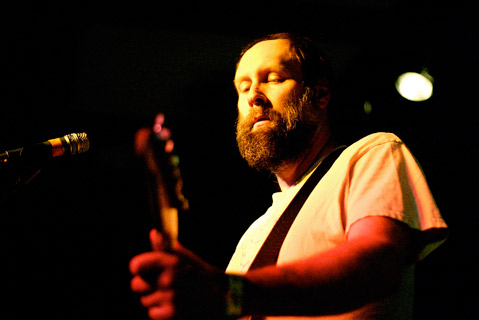Built to Spill at SOhO
Boise’s Unlikely Rock Heroes Play Sold-Out Show

As if to complete the ’90s indie-rock Triple Crown they started by presenting concerts by Black Francis and Yo La Tengo earlier this year, promoter Club Mercy brought Built to Spill back to Santa Barbara for a sold-out show at SOhO this past Tuesday. It was there that 40-year-old frontman Doug Martsch once again proved why he’s one of the unlikeliest and most enduring of rock’s underground heroes.
The twitchy, spring-loaded way Martsch’s head bobbles while he sings is the closest thing to a stage move the guy has. The indie-rock vet even seemed surprised that so many in the audience could sing his tunes for him when he left out lines. This understated persona (humorously highlighted by his shy “Thanks, guys” responses to the bellows and screams of appreciation from audience members) and the fact that, over the past couple years, he apparently has participated in several fantasy basketball leagues with other musicians, friends, and his 14-year-old son, prove that he’s pretty much a regular dude who happens to make music for a living.
The show began with a surprisingly low-key choice: “Liar,” from 2006’s You In Reverse. But things really kicked into gear with the lonely first chords of “The Plan,” off 1999’s classic Keep It Like a Secret. Though Martsch is known as the principal guitarist in the group, the two additional axe men touring in Built to Spill (Jim Roth and Brett Netson) added layers of sound that brought texture and power to songs like “The Plan,” making it hard to imagine each instrumental break without the meteor shower of high pitched guitar noise that they dropped through the song’s atmosphere.
Some selections reinforced the charge that Built to Spill can be a bit longwinded with their instrumental passages. Case in point: the noodle-filled orchestrations of “Carry the Zero,” in which the group started to sound like a jam band—but sans the flashy chops, and with more effects pedals. The encore performance of “Conventional Wisdom”—which, in recorded form, clocks in at a now-seemingly concise six-and-a-half minutes—had more false endings than a Peter Jackson film. Unsurprisingly, Martsch began to lose his voice during the encore. Luckily he had plenty of fans in the audience jumping in to fill the vacancy.



